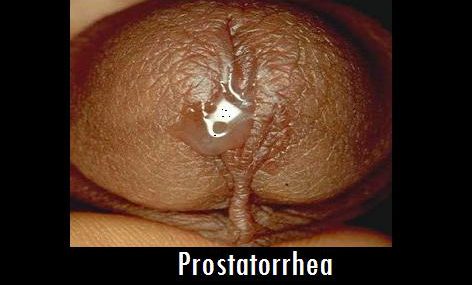Prostatorrhea Causes Symptoms and Treatment
What is Prostatorrhea?
Prostatorrhea (простаторея) is an abnormal condition characterized by involuntary leakage of prostatic fluid that occurs due to straining when emptying the bowels or while urinating. In most cases, straining commonly accompanies a strong urge to urinate associated with urinary hesitancy.
Symptoms
What are the symptoms of Prostatorrhea?
Main symptoms of Prostatorrhea include:
Penile discharge, in most cases, patients complain about abnormal discharge of prostatic fluid that smells like semen as it contains lecithin. The discharge contains no spermatozoa, no leukocytes, and no pus cells, it is non sticky and milky white in nature, however, sometimes it is transparent.
The vast majority of patients complain about a thin colorless or milky drop of clear, non sticky fluid at the meatus, which is discharged in greater quantity during defecation or after urination. Other common symptoms include:
- Urinary hesitancy, having to push or strain to start the urine flow
- Chronic straining when emptying the bowels
Causes
What are the causes of Prostatorrhea?
Noninflammatory Prostatorrhea may occur spontaneously; However, in most cases, the condition may be confounded with follicular prostatitis. Less commonly, Prostatorrhea may be caused by atony due to deteriorated nerve force from prolonged nerve compression.
Noninflammatory Prostatorrhea may develop into follicular prostatitis.
Other causes of Noninflammatory Prostatorrhea include:
- Benign prostate enlargement (BPE, benign prostatic hyperplasia, BPH)
- Sexual dysfunction due to strain
- Alcoholism
- Drug addiction
- Neuropathy due to diabetes mellitus
- Improper sexual behavior such as achieving orgasm without ejaculation on long term, or masturbating without orgasm for long.
- B12 deficiency
- Zinc deficiency
- Compromised immune system
- Malnutrition
Inflammatory Prostatorrhea can be caused by:
- STD infections, such as gonorrhea, HIV, syphilis and chlamydia
- Gastrointestinal infections, such as E. coli, Shigella, Salmonella, Campylobacter, Clostridium, Rotaviruses, Giardia, Entamoeba, etc.
- Infectious follicular prostatitis
Diagnosis
How to diagnose Prostatorrhea?
Diagnosis based on clinical signs and symptoms
Laboratory tests can help identify anatomical abnormalities and pathologies, confirm a diagnosis, plan treatment, check to see if treatment is working, etc. The tests below may be used to help confirm the diagnosis:
- CT of the abdomen and pelvis with iv contrast
- Urinalysis and culture test
- A CBC blood test
- A digital rectal examination (DRE) is a simple test used to check the prostate, in which the doctor inserts a lubricated gloved finger into the rectum to palpate the prostate and nearby tissues
Treatment
How to treat Prostatorrhea naturally?
Sage Leaf Tea is optimal for the treatment of Prostatorrhea. Sage is a medicinal herb that have been used as a treatment modality for centuries, especially in the treatment and prevention of gastrointestinal and urinary tract pathogenic infections, and chronic inflammatory gastrointestinal conditions.
Directions
How do you make sage leaf tea?
- Put 1 liter of water in a teapot
- Bring water to the boil
- Take a few torn sage leaves
- Place in boiling water
- Boil an additional 3 to 5 minutes
- Strain into a glass
- Add sweetener of choice
- Serve. The tea is now ready to drink.
Drink one cup of sage leaf tea a day, preferably in the morning, 30 minutes after eating.
Ginger tea is an excellent herbal tea that is made from ginger root. Ginger is a medicinal herb that have been used in the treatment and prevention of cardiovascular, gastrointestinal and neurological disorders.
Directions
How do you make ginger tea?
- Wash, peel, and grate the ginger root
- Place in 1 liter water
- Bring water to the boil
- Strain into a glass
- Add a few drops of lime juice. This step is optional
- Add sweetener of choice
- Serve. The tea is now ready to drink.
Drink three cups of ginger tea a day, preferably 30 minutes before or after meals.
Immunal® (Echinaceae purpurae herbae succus) is a supplemet used to strengthen the immune system. Take one 80 mg tablet of Immunal® twice a day, after meals. Alternatively, add two 0.8 ml drops of Immunal® in 1/4 cup of water, take 3 cups a day, ideally before each main meal.[1][2]
Multivitamin mineral supplements (Vitamin B12, Vitamin C, Vitamin B9, Ca, Mg, Zn, etc.)
Etiotropic treatment
What medications can be used for Prostatorrhea?
Antivirals or antibiotics to treat infections
Fluoxetine (Prozac) to treat stress and anxiety
Ganaton (one 50 mg tablet 3 times a day, before meals), and Trimedat (one 150 mg tablet, twice a day, before meals) to treat irritable bowel syndrome (IBS) related symptoms.
Prevention
How to prevent Prostatorrhea?
Lifestyle modifications, promoting healthy lifestyle, abide sitting still in one place for too long, have sex at least twice a week, eat a balanced diet, get enough sleep, stop using drugs, quit smoking cigarettes, drink plenty of fluids, stop porn addiction, get in shape, limit alcohol consumption per day to no more than three servings (40.8 g)/day, as it reduces the risk of neurological and cardiovascular diseases.
Practicing sports, this should include at least 5 hours of physical workout per week
Walking for 30 minutes every day
References
Verified by: Dr.Diab (October 1, 2020)
Citation: Dr.Diab. (October 1, 2020). What is Prostatorrhea? Causes Symptoms and Treatment. Medcoi Journal of Medicine, 17(2). urn:medcoi:article17708.














There are no comments yet
Or use one of these social networks